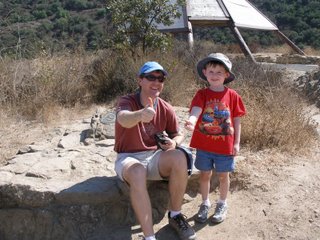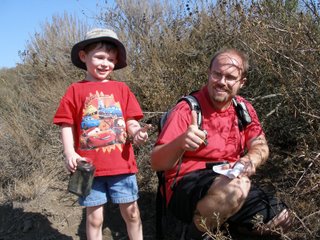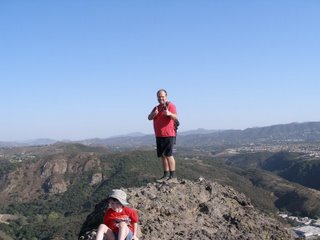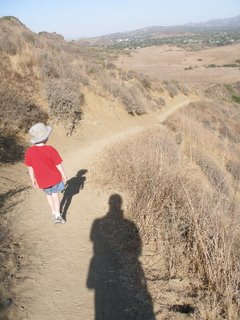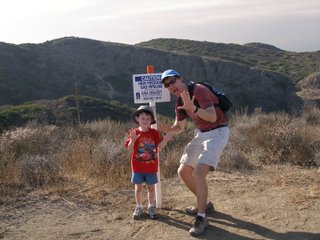Today was one of those glorious mornings in
Wildwood Park. After living in
Thousand Oaks for 26 years, I've noticed that the
Conejo Valley is a battleground between the ocean and the desert. The ocean frequently sends its cool moist air through the canyons to take the chapparal by storm (well, by fog, usually), only to have it beaten back by the arid siroccos blowing off the California desert. Well, this morning the ocean was winning this ongoing struggle.
At 7:00 A.M. I headed out on the service road past parking lot 1 and down into the barranca. As I descended into the misty fog that filled the canyon, the rising sun glowed orange behind the layer of smoke that is drifting across our valley from the Day fire burning in the
Los Padres forest 1o miles northwest of Castaic. Scattering the ubiquitous rabbits as I went, I ran alongside the algae-infested creek and up over the optimistically named cascade, Paradise Falls. (Milton would disagree, of course. There's always so much to regain.)
Then, there's the climbing up out of the canyon, past the iconic large wooden teepee, which no self-respecting
Chumash native person would be caught dead in, and onto the ill-named Stagecoach Bluff trail. Stagecoach Bluff trail is barely wide enough for mountain bikes, extremely rocky, very steep in places, and edged with prickly pear cactus, spiny yucca, and manzanita bushes. How anyone thought a stagecoach could possibly have traversed such a bluff is beyond me. But it does stir romantic connotations of the wild ol' west, with cowboys, Indians, and ladies in distress. Although today you're much more likely to encounter a lady in distress due to dehydration or rattlesnake than Indian. But we should indulge the old timers from the Conejo Valley who named this trail. They wanted to preserve the Ronald Reaganesque hard-working rancher, straight-shootin' cowboy mystique that the original settlers here idealized (even though from what I can tell they were only simple farmers). And who can blame them now that our valley has completely fallen to the armies of progress, that onslaught of suburban expansion?
So, after traversing the Stagecoach bluff trail, I headed up again, this time toward the top of Lizard Rock. This Wildwood landmark actually has an appropriate name. When you are at the top of the first little hill at the entrance to the park and you look west across the Mesa trail, the outcrop of
volcanic breccia actually does look like a lizard's head sticking out from the top of the ridge. Now the trail to the top of Lizard Rock is steep and difficult. It runs along the edge of a cliff on one part, overlooking the
Hill Canyon Wastewater Treatment Plant. This essential facility often fills the canyon and ridges above with the lovely perfume of chemically treated excrement that only 127,000 residents can consistently provide. If these odors offend you, try to visit the park on a day when the Santa Ana winds are blowing out to sea. You may be dry, hot and thirsty, but the air will be filled with a potpourri of sage, oak, and chapparal grasses. Today, however, since the ocean was winning its epic struggle with the desert, I got a snout full of vile smelling wastewater effluence as I climbed to the top.
But once I got past the cliff, up over the last rocky climb, and through the scratchy dried out mustard plants dangling across the trail, I witnessed something that you can only see maybe a half dozen times during the year. I stood on top of Lizard Rock at 931 feet above sea level and looked out over a landscape that was blanketed in fog. I was standing on a small island of rock in an ocean of white cloud. I looked to the South toward Newbury Park and couldn't see any of the housing developments that surround Amgen. I looked to the East to see the fog flowing into Wildwood Canyon, like an icy sea into a fjord. I turned around and looked North and West toward the Santa Rosa valley and all the ranch houses and farm fields had disappeared, tucked under this white comforter. A flat layer of white cloud had moved up from the Camarillo plain, through the canyons and valleys, and was reaching out with its ghostly fingers, clinging to the sharp ridges of Box Canyon and flowing silently through the undulations of the rugged hills that rim the edge of our valley. I felt fatigued from the climb, but exhilarated by the sight.
And whenever I stand at that height, reflecting on this natural wonder, I always think of these lines from
Wordsworth's Ode:
The Soul that rises with us, our life's Star,
Hath had elsewhere its setting,
And cometh from afar:
Not in entire forgetfulness,
And not in utter nakedness,
But trailing clouds of glory do we come
From God, who is our home:
Heaven lies about us in our infancy!
It may not be paradise exactly, but such a beautiful sight always fills me with a child's sense of wonder. So, with spirit refreshed, "then off, off forth on swing," I headed back down the mountain. I ran past the huge stand of prickly pear cactus, which I like to call the Brer rabbit warren since the rabbits flee to safety there. I flew across the rolling Mesa trail (I like to think I was flying, at least). And I pushed it over the two "speed bump" hills to finish my 4+ mile run at the trail head. I ran it in 36 minutes, 12 seconds today, which is only 19 seconds off my best time of 35:53. Gotta be pleased with that.
One last note: if you want to see the sea of cloud from atop Lizard Rock, you have to find the perfect weather conditions and be there at just the right time. If you go too early or the temperature and weather pattern isn't right, the whole valley, including Lizard Rock, will be inundated with fog. If you go too late, even if the weather conditions are just right, all the fog is gone. On my run, I usually get to the top of Lizard Rock by 7:30, and I only get to see this maybe two or three times a year. I'm guessing the fog in the canyon and valley today lasted until 8 or 9. Our foggy times are intermittant and unpredictable (you never know when the ocean is going to win a battle), so it's impossible to predict when this will occur. I just rely on serendipity and enjoy it when I can.

